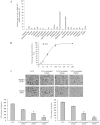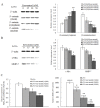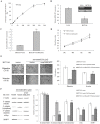Resveratrol inhibits invasion and metastasis of colorectal cancer cells via MALAT1 mediated Wnt/β-catenin signal pathway
- PMID: 24244343
- PMCID: PMC3823921
- DOI: 10.1371/journal.pone.0078700
Resveratrol inhibits invasion and metastasis of colorectal cancer cells via MALAT1 mediated Wnt/β-catenin signal pathway
Retraction in
-
Retraction: Resveratrol inhibits invasion and metastasis of colorectal cancer cells via MALAT1 mediated Wnt/β-catenin signal pathway.PLoS One. 2025 Jul 14;20(7):e0328012. doi: 10.1371/journal.pone.0328012. eCollection 2025. PLoS One. 2025. PMID: 40658675 Free PMC article. No abstract available.
Abstract
Resveratrol, extracted from Chinese herbal medicine Polygonum cuspidatum, is known to inhibit invasion and metastasis of human colorectal cancer (CRC), in which long non-coding Metastasis Associated Lung Adenocarcinoma Transcript 1 (RNA-MALAT1) also plays an important role. Using MALAT1 lentiviral shRNA and over-expression constructs in CRC derived cell lines, LoVo and HCT116, we demonstrated that the anti-tumor effects of resveratrol on CRC are through inhibiting Wnt/β-catenin signaling, thus the expression of its target genes such as c-Myc, MMP-7, as well as the expression of MALAT1. In detail, resveratrol down-regulates MALAT1, resulting in decreased nuclear localization of β-catenin thus attenuated Wnt/β-catenin signaling, which leads to the inhibition of CRC invasion and metastasis. This finding of ours surely provides important pre-clinical evidence supporting future use of resveratrol in prevention and treatment of CRC.
Conflict of interest statement
Figures








References
-
- Fidler IJ (2003) The pathogenesis of cancer metastasis: the seed and soil hypothesis revisited. Nat Rev Cancer 3: 1–6. - PubMed
-
- Xu TM, Cui MH, Xin Y, Gu LP, Jiang X, et al. (2008) Inhibitory effect of ginsenoside Rg3 on ovarian cancer metastasis. Chin Med J 121: 1394–1397. - PubMed
-
- Chang JS, Liu HW, Wang KC, Chen MC, Chiang LC, et al. (2005) Ethanol extract of Polygonum cuspidatum inhibits hepatitis B virus in a stable HBV-producing cell line. Antiviral Res 66: 29–34. - PubMed
-
- Chin YH, Yu PC, Jeli C (2007) Antioxidant activity of extract from Polygonum cuspidatum. Biol Res 40: 13–21. - PubMed
-
- Feng L, Zhang LF, Yan T, Jin J, Tao WY (2006) Studies on active substance of anticancer effect in Polygonum cuspidatum. Zhong Yao Cai 29: 689–691. - PubMed
Publication types
MeSH terms
Substances
LinkOut - more resources
Full Text Sources
Other Literature Sources
Medical

